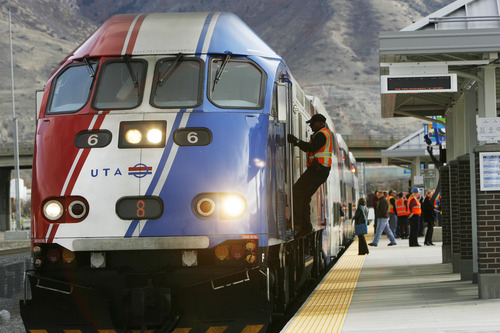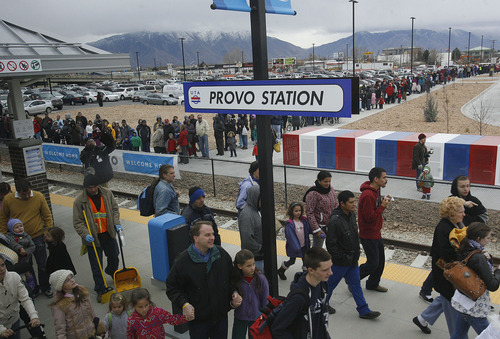This is an archived article that was published on sltrib.com in 2013, and information in the article may be outdated. It is provided only for personal research purposes and may not be reprinted.
Everyone could ride Utah Transit Authority trains and buses free during January and July under a proposal unveiled Friday — although it is seen as a long-shot on Capitol Hill.
Rep. Joel Briscoe, D-Salt Lake City, asked the Infrastructure and General Government Appropriations Committee for $9 million to allow the experiment to see how free fares would increase ridership and help clean air pollution in two of the most troublesome months for clean air.
Bruce Jones, general counsel for UTA, said the agency's fare box revenues average $150,000 a day, or $4.5 million a month — so funding two months of fares would cost $9 million.
The costs to UTA could be higher, Jones added in an interview, because the agency might need to add trains and buses to handle crowds if ridership increased significantly. Still, he said UTA supports the aim of the proposal.
"January is the month with the most inversions on the Wasatch Front," Briscoe said in explaining why he chose that month. He added July to his proposal, noting it has high ozone pollution.
The Wasatch Front Regional Council has figured, according to Briscoe, that if transit ridership doubled, it would decrease particulate pollution from vehicles by 2.2 percent and overall pollution by 1.1 percent.
He said offering free transit on just red days with high pollution would not provide as good a test period as a full month or two to measure how much free fares would reduce pollution, and on-again, off-again free fare would make planning more confusing for commuters.
"Our thinking is that if we say, look, everyone understands how bad it is in January. Plan ahead for it. We're going to help you out and give you an incentive. Take transit in January and see how it goes," he said.
Briscoe said in an interview that given tight budgets, his request is probably a long-shot. "But you never know. Pollution and clean air have been a hot topic this year."
Northern Utah valleys suffered a tough pollution season this winter, with 20 days when particulate pollution exceeded the U.S. Environmental Protection Agency's health based standard for PM2.5 in Salt Lake County and 28 days in Cache County. Although there was no air-quality legislation proposed at the beginning of the 2013 Legislature, bills have emerged in recent weeks, spurred in part by the public outcry during the high-pollution episodes and also by concern about the smoggy black eye the state was getting during the annual Sundance Film Festival and the Outdoor Retailers Association winter meeting in Salt Lake City.
Protesters have rallied outside the Capitol and staged sit ins three times. And the Utah Physicians for a Healthy Environment have called on Gov. Gary Herbert to declare a public health emergency because of the bad air.
Herbert's office did not comment directly on Briscoe's proposal. But Ally Isom, his deputy chief of staff said, "The governor welcomes ideas that foster constructive dialogue around solutions that are practical, legal and meaningfully improve our air."
House Majority Whip Greg Hughes, R-Draper, who is also chairman of the UTA board, said he appreciates Briscoe's proposal, but doubts it has much chance "in challenging budget times where there are alternate clean-air proposals that may stretch our dollars further," such as more use of natural gas in the state government's fleet.
Hughes added that the UTA board has been pursuing a goal "to reduce our investment per rider, or subsidy," and Briscoe's proposal would be contrary to that.
Briscoe is drafting separate legislation that would allow the two-months-a-year experiment, but requested the funding for it on Friday because appropriators plan to work over the weekend on priorities for available funds.
The only criticism of the idea Friday came from Sen. David Hinkins, R-Orangeville, who suggested it would be unfair to rural taxpayers.
Hinkins wanted to know: "Why the taxpayers of southeastern Utah should have to subsidize a Salt Lake County issue?"
Briscoe responded that reducing air pollution could cut Medicaid and other costs from respiratory problems, and all state taxpayers share in those costs.
Separately from the free-fare proposal, UTA's Jones said in an interview that the agency is also seeking corporate sponsors that may offer free passes via the Internet on bad-air days, similar to those offered recently by Rio Tinto.
Bill Tibbitts, associate director of the Crossroads Urban Center, also wrote appropriators asking that if they cannot fund the full request, to consider a reduced program — including perhaps offering one free-ride month instead of two; offering deep discounts instead of free rides; or offering a state match to any incentives offered by UTA or local governments for discounts.
Erin Mendenhall, outreach coordinator for the health-advocacy group Breathe Utah, praised legislators for at least considering the proposal to help reduce pollution. "In an entire-community issue we need bipartisan support," she said in an interview.
— Judy Fahys contributed to this report o





